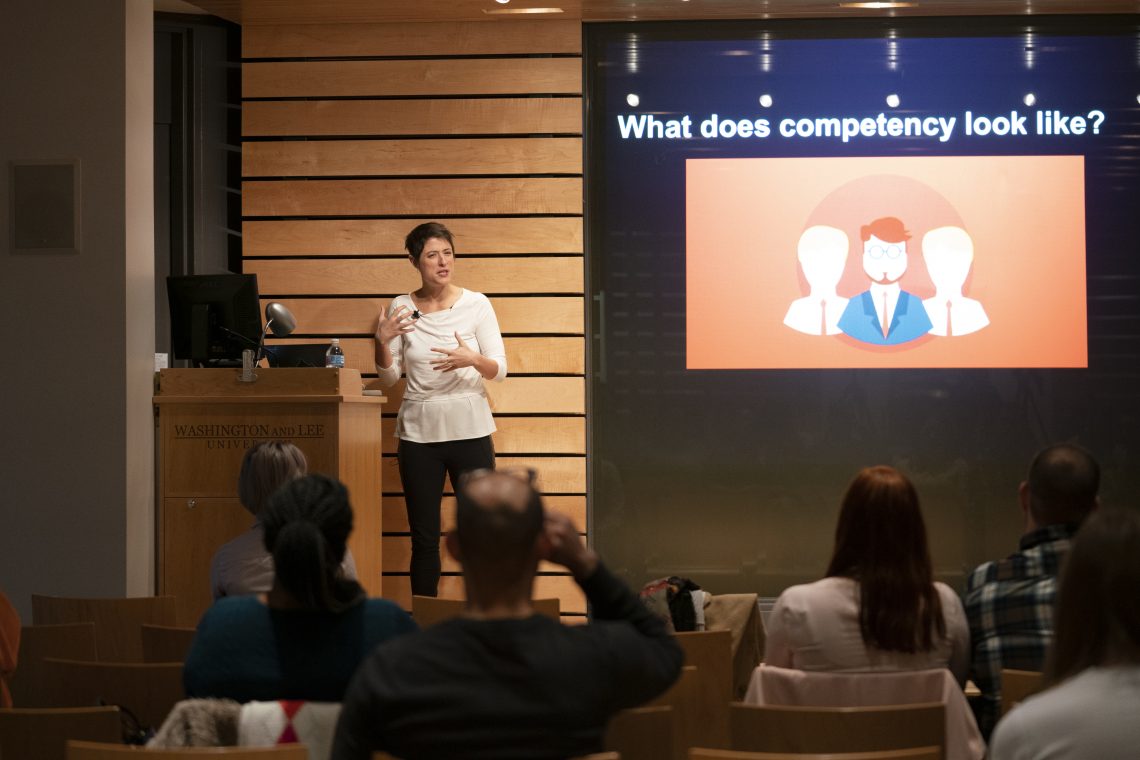On two different days during winter term, students in DCI 393, the capstone course for the Digital Culture and Information minor, visited the Scholars’ Lab at the University of Virginia. The students, Katherine Dau ‘19 and MaKayla Lorick ‘19, were joined by Professors Brooks and Bufkin, who teach DCI 393, and Kellie Harra, DH Post-Baccalaureate Fellow. The visitors participated in three different workshops both days, taught by graduate students who were instructed to develop a session that incorporated DH tools into their respective research discipline. These graduate students study a wide range of fields, from History and Art History to Urban and Environmental Planning, and integrated the DH tools into their own work. This made for interesting discussions with helpful background information coming from the graduate students as they related the workshop activities to their own research. Since we don’t have the space to describe in detail all of the workshops we participated in, I’ve included a summary of two of the workshops that I found to be especially interesting.
The first was a workshop by Chris Whitehead on social networks and network analysis. Chris was a 2018-2019 Praxis Fellow at the Scholars’ Lab, with a research focus on the history of Native peoples. In particular, he looked into the kinship ties that bound or separated Native and European peoples in New France, New England, and New York during the 17th and 18th century. The audience quickly became involved in this workshop. Chris explained some of the concepts involved in a network, and then asked us to create our own network that connected the various members of the audience. After throwing out a few different ideas, Chris stopped us so we could discuss some of the things we had realized in our conversations: first, there are different variables that could be used to make a network, but we needed to identify the ones that would be most relevant in creating useful information; and second, that we should develop a method to identify not only connections, but the strength of those relationships. In the end, we decided that the three different types of string Chris had provided us with could be used to represent the frequency of contact between two people, thereby showing the strength of their connection. By the time we had finished tossing rolls of string across the table, down the table, and to our neighbors, we were able to see the relationship of all the audience members to one another. It was interesting to see how the group from W&L connected with the group from UVA and who the key people were, according to the network, in making connections between the two groups.
The second workshop I found to be intriguing covered digital editing and transcription and was taught by Catherine Addington. Catherine has been at the Scholars’ Lab for two years, first as the Makerspace Technologist from 2017-2018, and then as a Praxis Fellow during the 2018-2019 year. She studies colonial Spanish America, with a focus on transcription and the earlier editing of indigenous and Catholic religious texts by Spanish writers. Like with Chris’s workshop, Catherine quickly engaged the audience by beginning the workshop with a question: “How would you transcribe the first lines of the Declaration of Independence?” This was followed by a task: take out a piece of paper, phone, laptop, or anything else you can write on and transcribe those lines. As we finished, it became clear that a seemingly simple task quickly led to more questions: Do you include the (slightly odd) capitalization shown in the original document? What about the punctuation? Spacing? Line breaks? As the workshop continued and we began looking at other documents, questions like “Is that smudge in the corner important?” began to emerge. These types of questions became more and more difficult to answer, but they can still be important to the transcription process. We learned about the different theories behind digital editing (are you trying to transcribe the document as a whole – when the spacing and that weird smudge might be important – or just the text from a document – when perhaps only the capitalization is necessary) and the importance of identifying the audience most likely to be using the transcription. From there, developing a standard based on the audience’s anticipated needs is key. Creating a set standard and plan at the beginning, before any of the work is actually completed, helps to keep things consistent and prevent case-by-case decision making while transcribing the document.
The workshops, all vastly different from each other, provided for an interesting and unique learning experience for the audience and visitors. Thank you to the Scholars’ Lab students and faculty who allowed DCI 393 to participate in and learn from the workshops. We enjoyed our visits to UVA and look forward to future collaborations with the Scholars’ Lab!
– Kellie Harra ’18, Digital Humanities Post-Baccalaureate Fellow
